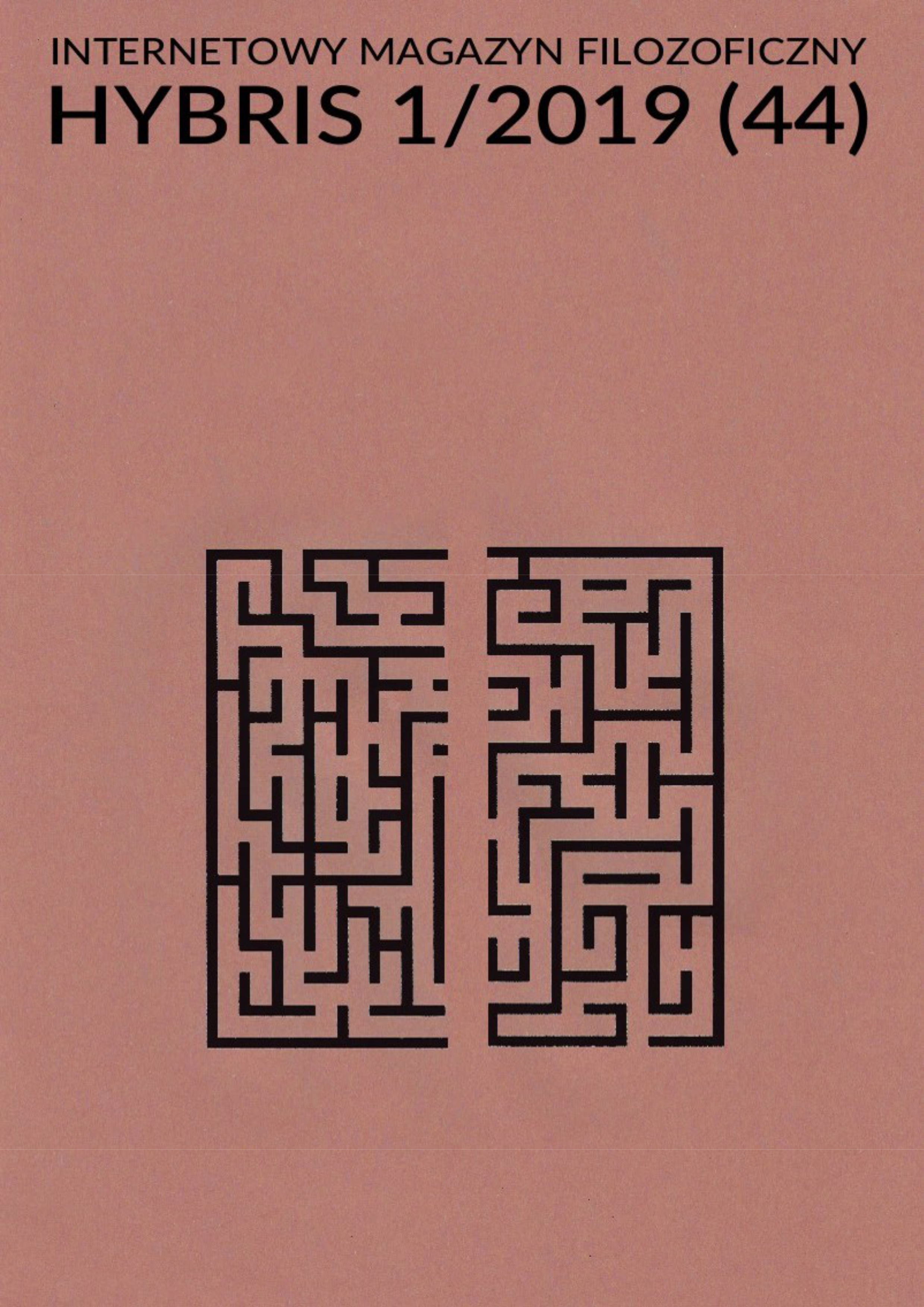Essentialism, antihaecceitism, and haecceitism
DOI:
https://doi.org/10.18778/1689-4286.44.09Keywords:
essence, essentialism, possible worlds, haecceiitsm, antihaecceitism, individuals, identityAbstract
A standard contemporary formulation essentialism defines essential properties with a help of a concept of possible worlds. It is often argued that in order to use possible worlds effectively, facts about transworld identity of individuals need to be determined. In this paper I discuss how essentialist might attempt the issue of transworld identity of individuals. Specifically, I analyze a connection between essentialism and the two theories that explain the transworld identity issue, that is, haecceitism and antihaecceitism. I provide a detailed analysis of different variants of antihaecceitism and argue, that all of them are incompatible with basic intuitions that stay behind essentialism. In contrast to that, I defend a position that essentialism ought to be combined with some form of haecceitism. In the remainder of this paper I provide the two ways through which essentialist might be a haecceitist.
References
Adams, R. M. (1974). Theories of actuality. Noûs, 8, 211-231.
View in Google Scholar
DOI: https://doi.org/10.2307/2214751
Adams, R. M. (1979). Primitive thisness and primitive identity. The Journal of Philosophy, 76(1), 5-26.
View in Google Scholar
DOI: https://doi.org/10.2307/2025812
Black, M. (1952). The identity of indiscernibles. Mind, 61(242), 153-164.
View in Google Scholar
DOI: https://doi.org/10.1093/mind/LXI.242.153
Cleve, J. (1985). Three versions of the bundle theory. Philosophical Studies, 47(1), 95-107.
View in Google Scholar
DOI: https://doi.org/10.1007/BF00355089
Correia, F. (2017). Real definitions. Philosophical Issues, 27(1), 52-73.
View in Google Scholar
DOI: https://doi.org/10.1111/phis.12091
Cover, J. A., O'Leary-Hawthorne, J. (1999). Substance and individuation in Leibniz. Cambridge University Press.
View in Google Scholar
DOI: https://doi.org/10.1017/CBO9780511487149
Cowling, S. (2012). Haecceitism for modal realists. Erkenntnis, 77(3), 399-417.
View in Google Scholar
DOI: https://doi.org/10.1007/s10670-012-9394-3
Cowling, S. (2017). Conceivability arguments for haecceitism. Synthese, 194(10), 4171-4190.
View in Google Scholar
DOI: https://doi.org/10.1007/s11229-016-1136-7
Dasgupta, S. (2009). Individuals: An essay in revisionary metaphysics. Philosophical Studies, 145(1), 35-67.
View in Google Scholar
DOI: https://doi.org/10.1007/s11098-009-9390-x
Dorato, M., Morganti, M. (2013). Grades of individuality. A pluralistic view of identity in quantum mechanics and in the sciences. Philosophical Studies, 163(3), 591-610.
View in Google Scholar
DOI: https://doi.org/10.1007/s11098-011-9833-z
Fine, K. (1994). Essence and Modality, Philosophical Perspectives, 8 (1994), 1-16.
View in Google Scholar
DOI: https://doi.org/10.2307/2214160
Fine, K. (2005). Modality and tense: philosophical papers. Oxford University Press.
View in Google Scholar
DOI: https://doi.org/10.1093/0199278709.001.0001
Hawley, K. (2009). Identity and indiscernibility. Mind, 118(469), 101-119.
View in Google Scholar
DOI: https://doi.org/10.1093/mind/fzn153
Heller, M. (2005). Anti-essentialism and counterpart theory. The Monist, 88(4), 600-618.
View in Google Scholar
DOI: https://doi.org/10.5840/monist200588428
Kaplan, D. (1975). How to Russell a Frege-church. The Journal of Philosophy, 72(19), 716-729.
View in Google Scholar
DOI: https://doi.org/10.2307/2024635
Kment, B. (2012). Haecceitism, chance, and counterfactuals. Philosophical Review, 121(4), 573-609.
View in Google Scholar
DOI: https://doi.org/10.1215/00318108-1630930
Kripke, S. (2001). Nazywanie a konieczność, przeł. B. Chwedeńczuk, Warszawa: Fundacja Aletheia.
View in Google Scholar
Lewis, D. K. (1986). On the plurality of worlds. Oxford: Blackwell.
View in Google Scholar
Lewis, D. (2001). Ramseyan humility. Department of Philosophy, University of Melbourne.
View in Google Scholar
Locke, D. (2012). Quidditism without quiddities. Philosophical Studies, 160(3), 345-363.
View in Google Scholar
DOI: https://doi.org/10.1007/s11098-011-9722-5
Lowe, E. J. (2008). Two notions of being: Entity and essence. Royal Institute of Philosophy Supplements, 62, 23-48.
View in Google Scholar
DOI: https://doi.org/10.1017/S1358246108000568
Mackie, P. (2006). How things might have been: Individuals, kinds, and essential properties. Oxford University Press.
View in Google Scholar
DOI: https://doi.org/10.1093/0199272204.001.0001
Maunu, A. (2005). Generalist transworld identitism (or, identity through possible worlds without nonqualitative thisnesses). Logique et analyse, 151-158.
View in Google Scholar
O'Leary-Hawthorne, J. (1995). The bundle theory of substance and the identity of indiscernibles. Analysis, 55(3), 191-196.
View in Google Scholar
DOI: https://doi.org/10.1093/analys/55.3.191
Paul, L. A. (2010). Mereological bundle theory. W: H. Burkhardt, J. Seibt, G. Imaguire (red.), The Handbook of Mereology. Philosophia Verlag, Munich.
View in Google Scholar
Plantinga, A. (1976). Actualism and possible worlds. Theoria, 42(1‐3), 139-160.
View in Google Scholar
DOI: https://doi.org/10.1111/j.1755-2567.1976.tb00681.x
Plantinga, A. (1979a). De essentia. Grazer Philosophische Studien, 7, 101-121.
View in Google Scholar
DOI: https://doi.org/10.5840/gps19797/819
Plantinga, A. (1979b). Transworld identity or worldbound individuals?. The Possible and the Actual, 146-65.
View in Google Scholar
DOI: https://doi.org/10.1093/0198244142.003.0006
Plantinga, A. (1983). On existentialism. Philosophical Studies, 44(1), 1-20.
View in Google Scholar
DOI: https://doi.org/10.1007/BF00353411
Robertson, T. (1998). Possibilities and the arguments for origin essentialism. Mind, 107(428), 729-750.
View in Google Scholar
DOI: https://doi.org/10.1093/mind/107.428.729
Roca‐Royes, S. (2011). Essential properties and individual essences. Philosophy Compass, 6(1), 65-77.
View in Google Scholar
DOI: https://doi.org/10.1111/j.1747-9991.2010.00364.x
Rosenkrantz, G. S. (1993). Haecceity: An ontological essay (Vol. 57). Springer Science & Business Media.
View in Google Scholar
DOI: https://doi.org/10.1007/978-94-015-8175-2
Russell, J. S. (2015). Possible worlds and the objective world. Philosophy and Phenomenological Research, 90(2), 389-422.
View in Google Scholar
DOI: https://doi.org/10.1111/phpr.12052
Russell, J. S. (2016). Qualitative grounds. Philosophical Perspectives, 30(1), 309-348.
View in Google Scholar
DOI: https://doi.org/10.1111/phpe.12078
Russell, J. S. (2018). Quality and quantifiers. Australasian Journal of Philosophy, 96(3), 562-577.
View in Google Scholar
DOI: https://doi.org/10.1080/00048402.2017.1363259
Salmon, N. (1996). Trans-world identification and stipulation. Philosophical Studies, 84(2), 203-223.
View in Google Scholar
DOI: https://doi.org/10.1007/BF00354487
Smith, D. C. (2016). Quid Quidditism Est?. Erkenntnis, 81(2), 237-257.
View in Google Scholar
DOI: https://doi.org/10.1007/s10670-015-9737-y
Speaks, J. (2012). On possibly nonexistent propositions. Philosophy and Phenomenological Research, 85(3), 528-562.
View in Google Scholar
DOI: https://doi.org/10.1111/j.1933-1592.2012.00616.x
Stalnaker, R. (2012). Mere possibilities: Metaphysical foundations of modal semantics. Princeton University Press.
View in Google Scholar
DOI: https://doi.org/10.23943/princeton/9780691147123.001.0001
Turner, J. (2016). Can We Do Without Fundamental Individuals? No. Current Controversies in Metaphysics, 24-34.
View in Google Scholar
DOI: https://doi.org/10.4324/9780203735602-2
Ujvári, M. (2013). Individual Essence: gibt es solche?. Metaphysica, 14(1), 17-30.
View in Google Scholar
DOI: https://doi.org/10.1007/s12133-012-0107-9
Van Inwagen, P. (1985). Plantinga on trans-world identity. W: Alvin Plantinga (101-120). Springer, Dordrecht.
View in Google Scholar
DOI: https://doi.org/10.1007/978-94-009-5223-2_2
Downloads
Published
How to Cite
Issue
Section
License

This work is licensed under a Creative Commons Attribution-NonCommercial-NoDerivatives 4.0 International License.
Funding data
-
Narodowe Centrum Nauki
Grant numbers 2017/25/N/HS1/01378






